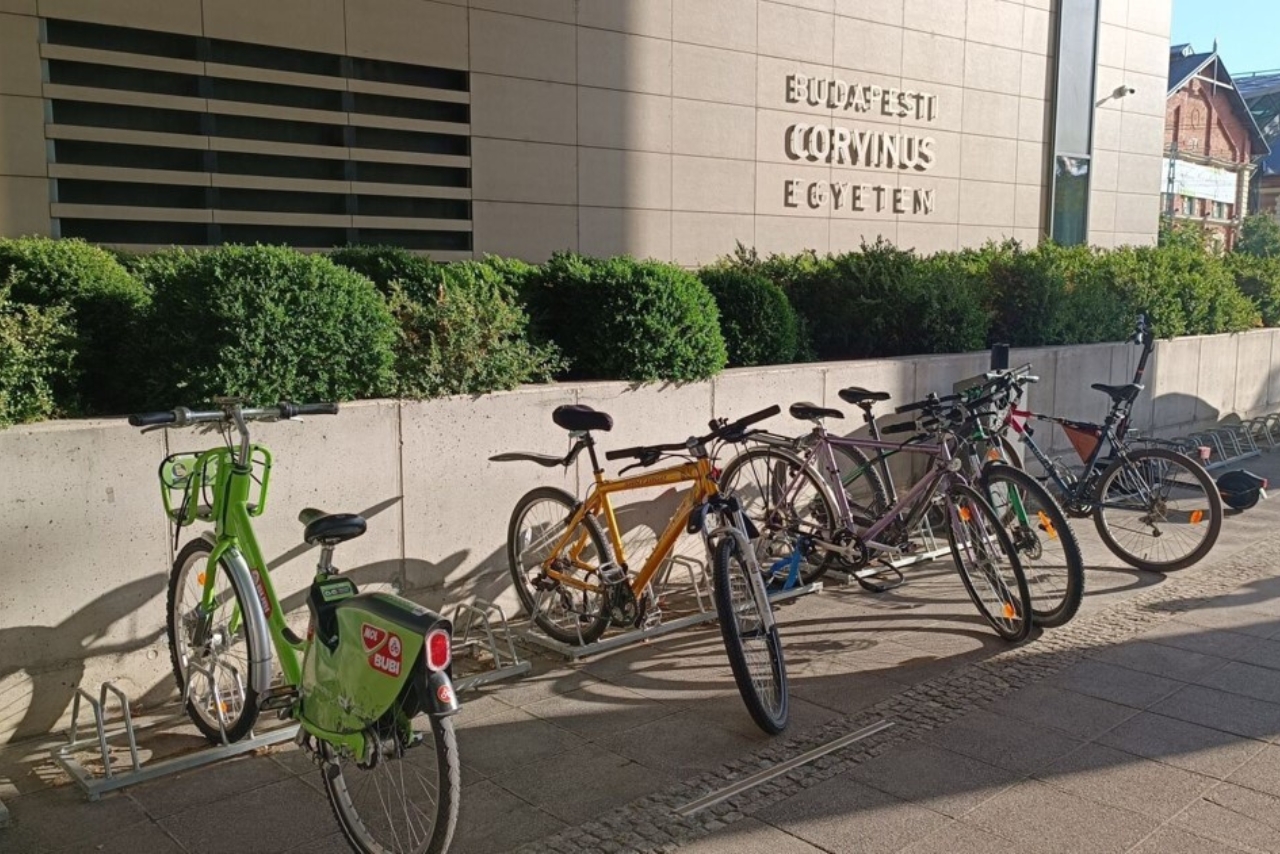Bring your bike to Corvinus during the European Mobility Week!

Around a fifth of global carbon emissions are transport-related, with almost half of this coming from passenger road transport, i.e. journeys by cars and buses. This accounts for 9.5% of total CO2 emissions. In addition, urban road transport also pollutes the air, leading to respiratory diseases, noise, congestion, traffic jams and the requires substantial areas for parking.
The European Car-Free Day on 22 September each year draws attention to these problems. The aim of the program is to highlight the environmental, safety and urban problems caused by increased car use and to encourage responsible transport choices, the benefits of sustainable, environmentally and people-friendly urban transport and the need to improve public transport, cycling, and walking.
At Corvinus and its surroundings, there are several options available for those who would like to replace the car and choose a more sustainable alternative. One of the most obvious options is, of course, public transport, as the university buildings are easily accessible by metro line 4, tram lines 2, 23, and 47-48-49, bus line 15 and trolleybus line 83.
In addition to public transport, there are several options for cycling
- Storage for students: Outdoor bicycle storage is available next to the three buildings of the University. There are 50 bicycle parking spaces available in the covered lobby at the entrance to building C, which is monitored by a camera, and also at the south entrance to building E. The security in the latter units may not be guaranteed, so it is important to use a bicycle lock.
- Staff lockers: University staff also have access to locked bicycle lockers in the underground car park of Building C. Requests for the use of locked bicycle storage facilities can be submitted via the Campus Services digital administration interface, the form is available on the Intranet under Digital Services (Campus Services / Request/bicycle storage). There is a one-off fee of HUF 5,000 for the use of locked bicycle storage facilities, which includes the fee for the card to open the storage.
- Showers and changing rooms: for those arriving at the University by bike, showers and changing facilities are provided in Building C. On the 6th floor of Building C (C660 and 661) and on the ground floor (C018 and 019), changing rooms, showers, and lockers are available for university citizens. It is recommended to use the changing rooms on the 6th floor, as the ground floor rooms are also used by students during PE lessons. The key (coin) to lock the lockers, which are not for permanent storage, can be picked up or dropped off at the reception of building C. In case of loss of the coin, the replacement cost will be charged to the user.
- Cycling to the Gellért Campus: bicycle storage is available
- for colleagues opposite the main entrance of the Sports Center,
- and for students at the main entrance, under the stairs. The use of these facilities is free of charge for everyone during opening hours. All visitors are responsible for the safe storage and locking of their bicycles.
- Bicycle service point: There is also a service post at the corner of the bicycle lockers in front of Building C on Közraktár Street. All the tools needed to carry out minor repairs on your bike are available there.
- MOL Bubi point: next to the building “Sóház” and on the other side of Fővám tér beyond the tram line there are also MOL Bubi point, where you can rent a bike in cases when you don’t have your own bike or if you only want to travel one way. The closest MOL Bubi station to the Gellért Campus is located on Gárdonyi tér, which is within walking distance of the building.
How many challenges will you complete in September?
The Sustainability Theme of the Month project will continue in the autumn semester, and in September we will write about sustainable transport options. In the first part of the series, we presented a vision of an imagined future in a 15-minute city, with challenges to achieve it.
- Ride your bike to the campus at least once a month.
- If you want a bigger challenge, ride your bike at least once a week.
- If you’ve been driving in Budapest, try out public transport for a day or two.
- Walk on weekdays if you only have to make 1-2 stops.
- Use the stairs instead of the elevators in university buildings.
- Every weekend, walk for at least an hour in a green environment, for example in the Buda Hills in Budapest.
- Look around to see what services (e.g., grocery store, hairdresser, cinema, café) are available in your neighbourhood. If you can, choose to walk to these rather than making a longer journey.
- Try for a week to choose electric instead of fossil-fuelled transport vehicles when you can (e.g., a tram or electrified train instead of a bus, a car-sharing service with an electric car instead of your own car).
- If you can, don’t take the car at all for a week!
- Check your phone to see how many steps you take on a typical day. For a week, try to do more each day than you did at the same time in the previous week.
________________________
In May 2024, we relaunched the Sustainability Topic of the Month project, with the aim of presenting an interesting and relevant topic at Corvinus every month. In September, we chose sustainable urban transport as our theme, and we welcome related events, activities and results at mate.kovacs2@uni-corvinus.hu.